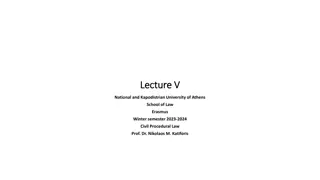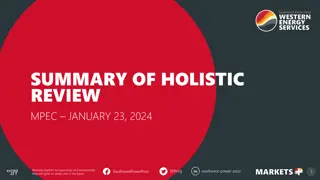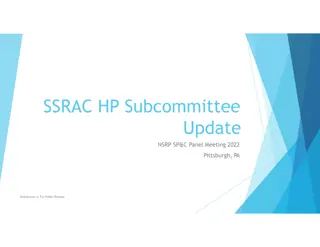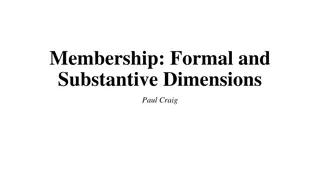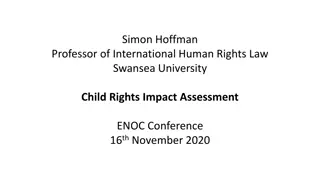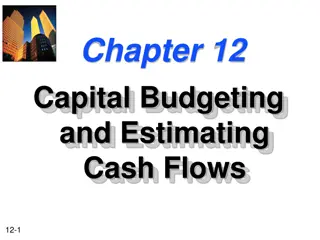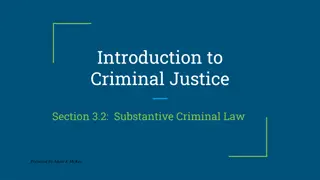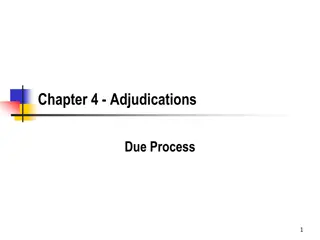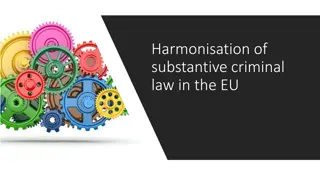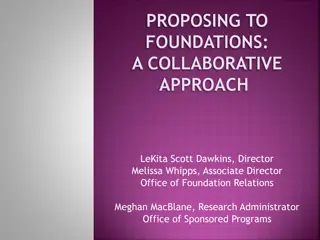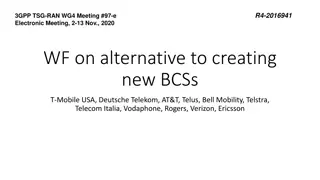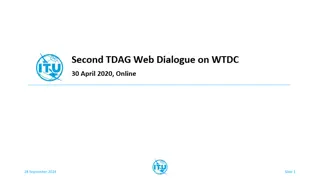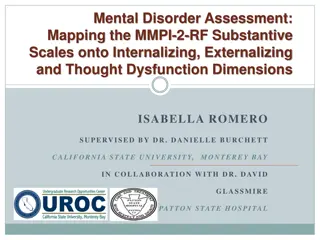Identifying Substantive and Non-Substantive Academic Proposals
Learn how to distinguish between substantive and non-substantive academic proposals in institutional effectiveness, research, and planning. Discover the criteria and processes for identifying these proposals, including which ones require specific approvals and reviews from academic committees. Gain insights into the impact of substantive changes on curricular requirements and the approval pathways for different types of academic programs.
Download Presentation

Please find below an Image/Link to download the presentation.
The content on the website is provided AS IS for your information and personal use only. It may not be sold, licensed, or shared on other websites without obtaining consent from the author.If you encounter any issues during the download, it is possible that the publisher has removed the file from their server.
You are allowed to download the files provided on this website for personal or commercial use, subject to the condition that they are used lawfully. All files are the property of their respective owners.
The content on the website is provided AS IS for your information and personal use only. It may not be sold, licensed, or shared on other websites without obtaining consent from the author.
E N D
Presentation Transcript
Substantive or Non-Substantive? How to Identify Substantive and Non-substantive Academic Proposals Institutional Effectiveness, Research, and Planning
Objectives Learn how to identify substantive or non-substantive academic proposals. Identify which substantive academic proposals require Southern Association of Colleges and Schools Commission on Colleges (SACSCOC) notification or approval.
Substantive or Non-substantive Academic proposals that constitute a substantive change may have a significant impact on curricular requirements or involve multiple academic units. They require review by the Faculty Senate. They may require review by additional committees (Core Curriculum Committee, Teacher Education, and/or Graduate Council). Academic proposals that constitute a non-substantive change may range from minor editorial updates to course or curricular changes. They do not require review by the Faculty Senate. They may require review by the Teacher Education Committee and/or Graduate Council.
Graduate Council All new graduate programs, non-substantive, and substantive program revisions are submitted to the Council for review and approval before submission to the Provost and Vice Chancellor for Academic Affairs and the Chancellor for final approval. Minor course changes (titles, prerequisites, non-substantive changes in descriptions) do not require review by the FSU Graduate Council and can go straight to the college dean for final approval, unless discipline-specific standards require further oversight.
Substantive Change Identifying Substantive Change Academic Proposals
Substantive Change Criteria Some substantive changes only require approval at the institutional level. FSU s curriculum committees and administration render the final decision. Some substantive changes require notification or approval by the UNC System Office and/or the Southern Association of Colleges and Schools Commission on Colleges (SACSCOC). These include major changes such as opening or closing academic programs, modifying the delivery of an existing academic program, opening a branch campus, or changing the university mission.
Substantive Change Criteria An academic proposal is a substantive change if it: Initiates, modifies, or eliminates a course in the undergraduate General Education Core Curriculum Modifies program admission and exit criteria Adds a new undergraduate program, minor, certificate, or concentration Adds new graduate certificates, minors, and concentrations Adds new courses to the list of University undergraduate General Education Core courses.
Substantive Change Criteria An academic proposal is a substantive change if it: Consolidates Programs and/or Departments Changes the name of a College, Department, or Program Closes an existing academic program Involves Cross Listing and Cross Leveling Courses Modifies prerequisite, credit hour, or other changes that include courses in more than one program Makes changes to any program of more than 50% of that program s credit hours.
Substantive Change Criteria An academic proposal is a substantive change if it: Involves program changes of more than 50% of their delivery format (for example, from face to face to online) Establishes new online delivery of programs, even for existing programs
Substantive Changes Requiring SACSCOC Substantive changes requiring SACSCOC notification or approval include: New Program (25%-49% New Content): A new program with 25-49% new content is a significant departure from the institution s existing programs and requires notification prior to implementation. New Program (50-100% New Content): A new program with 50-100% new content is a significant departure from the institution s existing programs and requires SACSCOC approval prior to implementation. Adding a program that is a significant departure from the existing programs, or method of delivery, from those offered when the institution was last evaluated.
Substantive Changes Requiring SACSCOC Substantive changes requiring SACSCOC notification or approval include: Initiating programs by distance education or correspondence courses. Adding an additional method of delivery to a currently offered program. A specific method of delivery applies when 50% or more of a program is delivered by that method. A program may be delivered 50% or more by more than one method.
Substantive Changes Requiring SACSCOC Substantive changes requiring SACSCOC notification or approval include: Adding competency-based education programs. Offering courses or programs at a higher or lower degree level than currently authorized. Program Closure: Closing a program requires SACSCOC approval. Approval requires a teach-out plan.
Substantive Changes Requiring SACSCOC Substantive changes requiring SACSCOC notification or approval include: Adding a new off-campus instructional site/additional location including a branch campus. Substantially increase or decreasing the number of clock hours or credit hours awarded or competencies demonstrated, or an increase in the level of credential awarded, for successful completion of one or more programs.
Substantive Changes Requiring SACSCOC Substantive changes requiring SACSCOC notification or approval include: Adding each competency-based education program by direct assessment. Adding programs with completion pathways that recognize and accommodate a student s prior or existing knowledge or competency. Awarding dual or joint academic awards.
Substantive Changes Requiring SACSCOC Substantive changes requiring SACSCOC notification or approval include: Dual Academic Award Cooperative Academic Arrangement with Title IV* Entities & Cooperative Academic Arrangement with Non-Title IV Entities. *A Title IV entity is an institution that processes U.S. Federal Student Aid.
Non-substantive Change Identifying Non-substantive Change Academic Proposals
Non-substantive Change Criteria Non-substantive changes only require approval at the institutional level. FSU s curriculum committees and administration render the final decision. Non-substantive changes normally do not require notification or approval by the UNC System Office and the Southern Association of Colleges and Schools Commission on Colleges (SACSCOC).
Non-substantive Change Criteria An academic proposal is a non-substantive change if it: Makes or changes selections from the university core courses for a major Initiates, modifies, or eliminates a course in the major that is unlikely to be part of another program. Modifies a prerequisite for a core course in the major that does not affect the Core Curriculum
Non-substantive Change Criteria An academic proposal is a non-substantive change if it: Changes the title, number, description, or prerequisite of an existing undergraduate course that is not part of another program s requirements. Makes minor changes to a program, as defined by no more than 50% of the total credit hours of the program, and which has no impact on other programs. Makes minor changes to an existing graduate program that do not impact other program s requirements, where minor is defined by less than 50% of the total credit hours of the program.
Non-substantive Change Criteria An academic proposal is a non-substantive change if it: Changes course name, course level, credit hours to not exceed the overall degree credit hours Updates a program Classification of Instructional Program* (CIP) Code *The U.S. Dept. of Education uses CIP codes (6-digit numbers) to identify academic programs. You can search the program codes at: https://nces.ed.gov/ipeds/cipcode/Default.aspx?y=56 Example: Psychology, General CIP code: 42.0101
Non-substantive Changes Requiring UNC System Approval Changing a Classification of Instructional Program (CIP) code The UNC System would need to update its list of instructional programs.
Additional Forms and Resources FSU Faculty Senate UNC System Academic Programs SACSCOC Substantive Changes
Thank You! Please share questions or comments with our team in the Office of Institutional Effectiveness, Research, and Planning.




